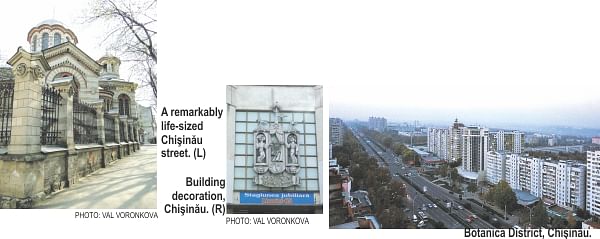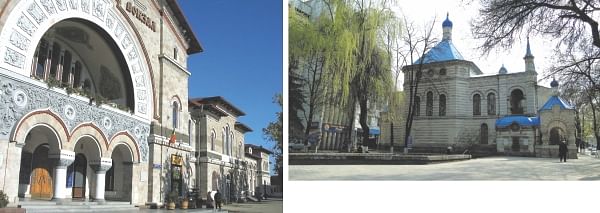| Home - Back Issues - The Team - Contact Us |
 |
| Volume 11 |Issue 02| January 13, 2012 | |
|
|
Travel The Dance of Lilliput Andrew Eagle I'm not as worldly as Jonathan Swift's Mr Lemuel Gulliver. I've never been to Blefuscu, Brobdingnag, Glubbdubrib or Japan. There was an occasion in 2002, however, when I sort of made it as far as Lilliput. The journey began in April, in that former Soviet apartment in Sviatoshyn, on the northern outskirts of the Ukrainian capital Kyiv. It was a suitable accommodation for the one-month teaching methodology course in which I had enrolled. I was destined to share the apartment with another out of town teacher attending the course, and after some time the doorbell rang. With a fluster of red hair by choice rather than design, forty-ish Alex bustled in with her luggage, hastily telling something to the driver who had brought her there. It was all in Russian, which she subsequently tried on me. She had been led to understand that I was a Russian teacher who had spent time in Australia. Flustered on account of the misinformation, she felt suddenly nervous of her English skills, usual for local English teachers in those parts. “I'm sorry I'm not Russian,” I apologised. She said it was okay.
Besides our British tutors, there were only two foreigners among the Ukrainian students: Alex and I. She was from Moldova. Moldova is a land sliver squashed between Ukraine and Romania, like a pair of long, thin lips unable to smile. About one-fifth the size of Bangladesh, it has 3.3 million people and a blend of cultures and languages, mostly Russian and Romanian. I thought I sensed in Alex a little of that Romanian expressiveness although she was in equal measure cynical and sensitive like our Ukrainian colleagues. Like Bengal, Moldova was divided by history, between her country which was part of the Soviet Union, then independent, and the region called Moldavia in Romania. In 2002 Moldova was purported to be the poorest country in Europe. It happened naturally, as we commuted together in those large white vans called ‘marshrutkas’ to the subway and rattled about on the metro, to and from class; and as we decided upon dinner which mostly she cooked and as we polished our assignments and lesson plans which I sometimes edited. With the weekends given to introducing ourselves to Kyiv there was nothing to do about it: Alex became my first Moldovan friend. It was the English tutors who did it: after some weeks, they one day pulled out a map to find out exactly where Moldova was. “Oh, I never realised it was so tiny,” one of them said, “so tiny!” “And without even a single beach,” said the other. Moldova's border is just 40 kilometres from the Black Sea but the coastline belongs to Ukraine. I doubt they meant it to be so but it wasn't a triumph of English diplomacy. They had used the word tiny a bit too enthusiastically and Alex, far from being a nationalist stalwart, was nonetheless upset.
I tried but it was difficult to console her because my imagination had been let loose. In the train on the way home I asked exactly how tiny Moldova was. For example: would it fit inside the carriage? From the marshrutka I pointed to a rusty garage and asked if it was Moldovan mansion-sized. With a string of stupid questions I did manage to gain from her a cynical smile. After the course was completed we shared a taxi first to the train station for me and then to the bus station for Alex. As Kyiv station is large with many platforms, when we parted Alex said, 'Do you know where you're going?' 'You know Alex,' I replied on a whim, 'I don't think any of us ever really know where we are going.' The moment was a scene from a 1950s film. Alex was Lauren Bacall. It should have been in black and white. Moldova took no benefit from the ensuing months. By June I could imagine traffic jams of tiny toy cars on footpath-breadth highways and by August Moldovans were brushing their hair with toothbrushes. The Moldova in my mind was getting smaller. The only thing that never quite fit was Alex herself. She had always seemed so normal-sized when we were in Kyiv. By December the chance arose to visit her in the Lilliputian capital Chişinău, although she had assured me there was nothing to see in Moldova. But she had helped with the paperwork to get the visa, an exhaustive process where Soviet protocols seemed to prevail, and, at the very least, I knew there was one thing to see: Alex. When going anywhere there are plans and contingencies to think of, but when the destination is Lilliput there are additional thoughts such as 'remember to step carefully so as not to tread on any buildings.' It was a snowy evening when the train pulled into Chişinău station, a remotely grand building not unlike the standard in ex-Soviet towns. I think the Russians with their sensibilities gave honour to the various farewells and greetings that occur on platforms, with the suitably cinematic backdrop of their railway stations, even in minor towns. Alex waited in a furry coat and hat and I felt so lucky to be meeting a friend. One might say it was a tiny triumph. “Ah, I see you've brought your camera,” she said as we left the station without ado, “I guess we'll have to find something for you to take a picture of.” As we rode in the marshrutka back to her house she said, “So what do you think of the size of our marshrutkas?” “They're remarkably life-sized,” I replied. The following morning we wandered about the normal-sized neighbourhood where normal-sized pedestrians asked me for average-sized directions and a not-undersized woman carried a normal-sized kitten like a baby, wrapped in a blanket of standard dimensions. There was only one conclusion to draw: Moldova had grown significantly since last I imagined it. Although a much larger city, Alex had found Kyiv a little slow, and with the people of Chişinău rushing about I could see it. “The Romanian temperament,” she said, “Everything has to happen right now.” I did use the camera: for the tree-lined avenues, the crowded marketplace and the cathedral. From history some buildings had traces of the Ottomans in their design. The highlight was the discotheque, an annual event for students at the university where Alex worked. We took a turn on the dance floor; we did the dance of Lilliput, and Alex asked if I had had dancing lessons, which was either an undue compliment or a heartfelt suggestion. There was a mathematics lecturer who proved the theory: mathematicians can't dance. There was a final year tourism student we met and I elbowed Alex to ask him what I should see in Chişinău, as a tourist. He thought for a long while and when the silence broke he said, “Well the cathedral is quite old and the train station is a nice building; and maybe you’d like to see our airport?” At 4 am as we headed home Alex said it was the first modern disco she’d ever been to. Such an honour it was to share that tiny life milestone with her! It was before I found Situ his mountain. It’s not true there’s nothing to see in Moldova. The country has cave monasteries and the world's largest wine cellars, Moldova being famous for wine; but December's not the season for those. And there's nothing to be regretted about a visit to Chişinău, with everything undeniably life-sized there. Nor will a visit to Chişinău leave you a hermit talking to horses as Mr Lemuel Gulliver's travels did to him, so there's that to recommend it. leave you a hermit talking to horses as Mr Lemuel Gulliver's travels did to him, so there's that to recommend it. But for me, since Alex learnt French and immigrated to Canada, Moldova's star attraction is gone. Some details are extracted from an e-mail home, written at the time.
Copyright
(R) thedailystar.net 2012 |
||||

